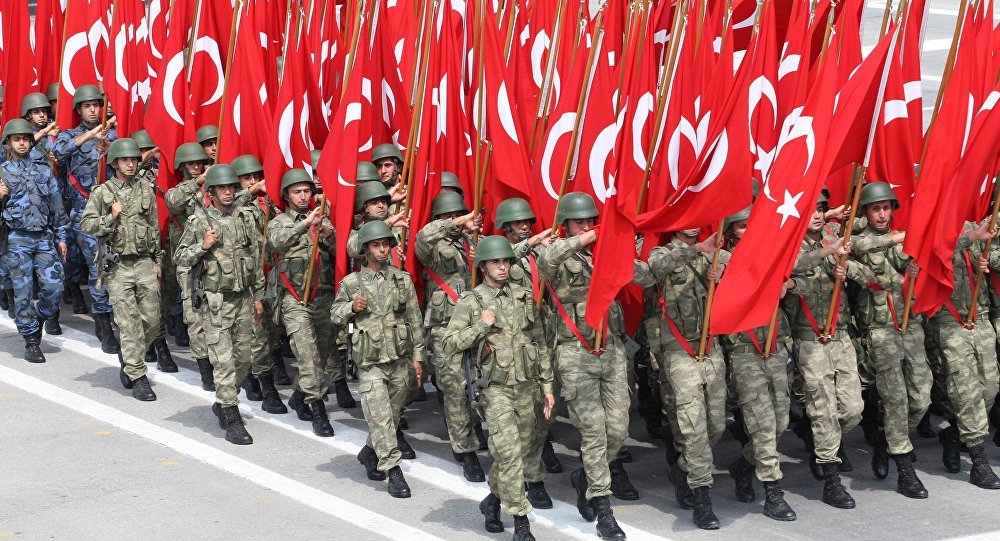Ankara taxes credit cards to finance the arms race
The proposal launched in recent days by the Akp to strengthen ‘deterrence capabilities’ in a regional framework of growing conflict. Speaking of Israel, the president called it ‘a danger that is approaching our country’. A record 165% year-on-year increase in defence spending is expected by 2025.
Istanbul (AsiaNews) - Turkey's government is proposing to tax credit cards to finance the domestic arms race and support investments in the defence industry, a priority in this turbulent phase in the Middle East in which the winds of war are blowing incessantly - and ever more vigorously.
This is how Ankara intends to recover resources and money to invest in armaments with the aim of ‘strengthening’ the ‘deterrence capabilities’ especially towards what is now considered the Israeli ‘threat’. It was President Recep Tayyip Erdogan himself who, at a conference on the ‘future of Palestine’ held on 15 October in Ankara, spoke, referring to the Jewish state, of a ‘danger approaching our country’.
According toAfp reports, the Justice and Development Party (Akp) is reported to have drafted a bill that would envisage a tax of 750 Turkish pounds (about 20 euro) to be applied to cards with a maximum credit line of up to 100,000 Try (almost 2,700 euro). It would be applied regardless of the amount actually spent and has already triggered fears and protests from consumers, who are appealing to banks to have their credit reduced. Finance Minister Mehmet Simsek intervened on the matter, announcing that the parliament could revise the text and set new application criteria.
However, the minister strongly defended the principle of this new tax, emphasising that ‘the objective’ behind it was ‘clear and evident: our country has no choice but to strengthen its deterrent capacity,’ he stressed.
‘Right now there is fire and war in our region. We live in a dangerous environment,' he added, even though consumers continue to be critical of the new tax at a time of economic crisis. ‘In other words,’ Simsek explained in an interview with private broadcaster NTV, ‘this is not an effort to reduce the budget deficit’.
In the first eight months of 2024, export revenues from Defence Industries reached .7 billion, an increase of 9.8 per cent compared to the same period in 2023, according to President Haluk Gorgun.
The sector, which includes the famous Bayraktar drones produced by the company linked to the ‘Erdogan clan’, accounts for almost 80 per cent of the country's export revenue and reached EUR 9.3 billion in 2023.
The 20 years have seen an enormous development, as the Finance Minister himself confirmed: ‘In the early 2000s, Turkey imported 80 per cent of its needs. Today it is the opposite: Turkey,' says Simsek, “produces more than 80 per cent of its needs (thanks to) 3,500 companies”.
Official numbers published in recent days confirm record funding for weapons and defence: Ankara is in fact preparing for a significant increase in 2025, according to an announcement by Vice-President Cevdet Yılmaz. The government intends to allocate around 1.6 trillion Turkish liras (around 46 billion dollars) for defence and security. Of this sum, 913.9 billion lira will be allocated to defence spending and 694.5 billion lira to internal security.
The country's combined budget for defence and internal security was ITL 971 billion in 2024 and ITL 524 billion for 2023. These figures show that the defence budget for 2025 is expected to increase by 165% compared to the previous year.
Taking into account the Central Bank's inflation forecast of 44.1% for the end of 2024, the defence and security budget still reflects a considerable real increase of more than 120%.
The Defence Industries Group, which reports directly to the presidency, is planning to build a missile defence system on the Israeli ‘Iron Dome’ model. Meanwhile, President Erdogan has confirmed in recent days that ‘even if there are people who do not see the danger approaching our country, we perceive the risk and are taking all our precautions’.
However, for the opposition this is propaganda in an attempt to ‘mask the economic crisis’ Turkey is going through. For Deniz Yucel, spokesperson for the Republican People's Party (Chp), the largest opposition movement in parliament, ‘the defence of the homeland (...) has become a political tool for the AKP, which is preparing a new plundering proposal by exploiting national sentiments’.
Turkey's double-digit inflation rate dropped below 50 per cent year-on-year last month, but exceeded 85 per cent in October 2022.







.png)











